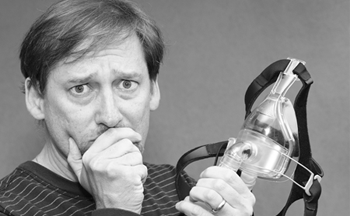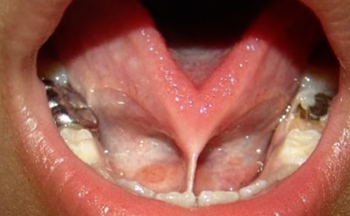Sleep Apnea (Obstructive Sleep Apnea)
There are two types of sleep apnea. The first type is Central Sleep Apnea, where
there is an altered signal (from the brain), to the muscles that control breathing.
The second type, which is the most common, is called Obstructive Sleep Apnea
(OSA). With OSA the muscles of the throat and palate, as well as the tongue, fall
back into the throat thus collapsing the airway while we sleep. This creates a
small passage or blockage for air to pass through the trachea and into the lungs.
There are many causes for this condition, among them are excessive tissue in
the back of the throat, large tonsils, obesity, structural anatomy, family history,
alcohol, and tobacco use. Sleep Apnea is more common in men than women,
especially over the age of 40. Common signs of sleep apnea include loud
snoring, gasping for air while sleeping, neck sizes greater than 17 inches in men
and 16 inches in women. When Obstructive Sleep Apnea occurs, there are
intermittent pauses in breathing that last at least 10 seconds each time. These
events can occur several times per hour, which create a lack of oxygen or
“Hypoxia” to the brain. In addition to hypoxia, our sleep patterns are severely
affected as REM sleep is rarely achieved. If left untreated, obstructive sleep
apnea is a very serious condition that can lead to heart attacks, high blood
pressure, stroke, depression, headaches, confusion, and extreme sleepiness
during daytime activities.
Diagnosing and treating Obstructive Sleep Apnea, requires a medical exam and
sleep study done by a qualified sleep study physician. The first part of the exam
usually involves a questionnaire called the “Epworth Sleepiness Scale”. This is a
screening tool that helps us decide if a sleep study is needed. When a sleep
study is ordered, it can be done in your home, or at a sleep study facility. Once
the study is complete, your physician will interpret the data from the test and
diagnose the level of sleep apnea. To treat this condition, a Continuous Positive
Airway Pressure or “CPAP device is usually prescribed by this physician.
Although the CPAP is considered the “GOLD Standard” for treating sleep apnea,
sometimes 25-45% of these patients cannot tolerate the CPAP device. This is
called “CPAP Intolerance”. When this occurs, an Orofacial Pain and Oral
Medicine Specialist like Dr. Leopold can help! Your sleep physician will consult
with Dr. Leopold and ask that a Dental Sleep Apnea appliance be made for you.
This device is called a Mandibular Advancement Device or “MAD”. Dr. Leopold
will deliver the device and titrate the appliance until your sleep apnea is
reduced. To confirm accurate adjustment of the MAD, a second sleep study
“with” the appliance inserted is done and adjusted as needed. If you feel that you have Obstructive Sleep Apnea, or your sleep
partner says your sleep is interrupted by snoring or gasping for air, please
consult our office. Dr. Leopold will collaborate with your sleep physician or refer
you to one. Together, Dr. Leopold and the sleep physician will create a
treatment plan to properly address your sleep apnea. DO NOT LET THIS
CONDITION GO UNTREATED, it could mean the difference between your health
and serious complications.


